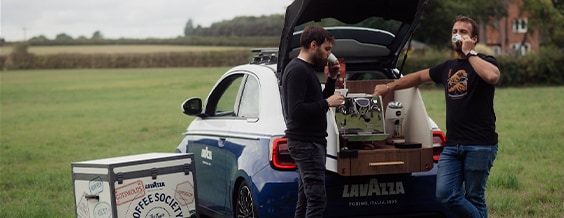*Lavazza is not affiliated with, endorsed or sponsored by Nespresso


Modern Slavery and Human Trafficking Policy
1. Introduction
The Lavazza Group is committed to developing its business in a sustainable way. Lavazza Group adopts a holistic approach to sustainability based on the values that have guided the group’s development for more than 125 years. Transparency, quality, innovation, attention to the environment, respect and promotion of human rights are the pillars on which we base our approach to sustainability. We are therefore committed to combat slavery and human trafficking.
2. Organisation's structure
The Lavazza Group has around 5,000 employees worldwide and operates in more than 90 countries either with local affiliated companies or with a wide network of commercial partners. The Lavazza Group global annual turnover in 2024 is 3.35 billion Euros (Group Financial Report 2023). The Lavazza Group is organized in the UK as follows:
- Lavazza Coffee (UK) Ltd (“Lavazza UK”) is a distributor in the sector of coffee and hot beverages in the Home and Out of Home channels;
- Lavazza Professional UK Ltd. and its controlled companies Lavazza Professional Operating Services Ltd and Stirlingshire Vending (Scotland) Limited (“Lavazza Professional UK”) is a manufacturer, distributor and service provider in the sector of coffee, tea and other hot beverages, vending machines and operated services;
Lavazza UK and Lavazza Professional UK are part of the Lavazza Group and their ultimate parent company is Luigi Lavazza S.p.A. (“Lavazza”), an Italian coffee roasting company owned by the Lavazza Family having its head office in Turin, Italy.
3. Our business
Lavazza UK is organised into one business unit covering three business channels across Retail, Foodservice and Office Coffee Services.
Lavazza Professional UK is organised into one business unit providing operated services, vending machines and associated hot drinks at work.
4. Our supply chains
The Lavazza UK supply chain is for the vast majority based on the coffee supplied by the parent Lavazza. Lavazza purchases the green coffee from producing countries and transports it by sea. The product is then kept in stock in a number of Italian and French warehouses and transported to the manufacturing plants for production. The other raw materials come from different suppliers, mainly based in Italy. The finished product is manufactured in 3 factories, 2 located in Italy (Torino, Gattinara) and 1 in France (Lavèrune). The coffee is decaffeinated in a factory located in Pozzilli (Italy).
The Lavazza Professional UK supply chain is based on raw materials such as coffee, tea, cocoa, packaging and machine components supplied by third party suppliers and licensed brands. The raw materials are then processed within the manufacturing plant in Basingstoke (UK) to make final products for sale. The Flavia® coffee machines commercialized by Lavazza Professional UK are produced by a third-party manufacturer based in China.
The other products sold by the Lavazza Group come from a variety of sources, with a significant component of coffee machines produced in Italy, UK, Poland and China. The distribution is organised with 3 major logistics centres in Italy and a central warehouse for each local subsidiary. All transfers between warehouses are performed with saturated means of transport and relying on intermodal transport whenever possible. Secondary distribution is entrusted to specialised logistics operators.
5. Our policies on slavery and human trafficking
We are committed to ensuring that there is no modern slavery or human trafficking in our supply chains or in any part of our business. Our policies reflect our commitment to acting ethically and with integrity in all our business relationships and to implementing and enforcing effective systems and controls to ensure slavery and human trafficking is not taking place anywhere in our supply chains.
We ensure that all our suppliers receive and accept the provisions of the Lavazza Code of Ethics and the Lavazza Supplier Code of Conduct. Both documents are publicly available at Lavazza Group | Compliance.
The Lavazza Group Code of Ethics dated 2022 aimed at concretely reiterating the ethical values that guide our way of doing business and confirming the principle that “growth is equally as important as maintaining and consolidating our identity”. The Lavazza Group has embarked on a path, which began by identifying the value system and the Purpose “Awakening a better world every morning” that best represents it, to then proceed with redefining its Code of Ethics and align it with these values. The Authenticity, Passion for Excellence, Responsibility and Inventiveness values aim to increase the cohesion and coherence of the Lavazza Group, fostering a sense of belonging, building a climate of trust inside and outside the company, inspiring and guiding the behavior of all those who, in their various capacities and with different responsibilities, contribute to achieving the Group's mission.
Lavazza Supplier Code of Conduct has been reviewed firstly in 2017, with the fundamental contribution of Lavazza’s reputable partners, specialized on topics of Sustainability and Human Rights:
- ITC ILO (International Training Centre of the International Labour Organization);
- Oxfam Italia Onlus;
- Save the Children Italia Onlus;
- OECD (Organisation for Economic Co-operation and Development).
In 2023, Lavazza Group reviewed the Supplier Code of Conduct for the second time, with the aim of updating it in alignment with the Group’s Values (Authenticity, Passion for Excellence, Responsibility and Inventiveness) and to deepen the spirit of cooperation and mutual standards in terms of impacts on all stakeholders
Furthermore, Lavazza Group published the Commitment on Human Rights: we believe that people must be treated equally, with dignity and respect: our key references and strong commitment are reflected on documents “Commitment to Human Rights” and “Commitment to Children’s Rights”.
In the belief that a corporate culture based on transparency and trust favors growth, the Lavazza Group supports and encourages anyone who wishes to report potential conduct that is inappropriate or irregular, or that could be deemed a violation of the Code. To this end, specific reporting channels have been set up, including the Whistleblowing platform, which can be accessed within the section dedicated to Compliance in the Lavazza Group corporate website and which has been subject of a dedicated training and in-depth learning activity.
Moreover, we issue the Sustainability Report on an annual basis and we make it available for all Lavazza Group’s stakeholders by publication on Lavazza Corporate website The Sustainability Report | Lavazza Group.
6. Due diligence processes for slavery and human trafficking
The Lavazza Group has always demonstrated a deep sense of responsibility towards the communities with whom it operates, striving to create shared value while always keeping the social and environmental implications in mind. This approach is reflected in our commitment to contribute to the achievement of the 17 Sustainable Development Goals of the United Nations’ Agenda 2030 and in our adherence to the United Nations’ Global Compact. Since 2015when Lavazza published its first Sustainability Report, the Company has sought to embark on a journey to gradually integrate sustainability into all business activities. For a more incisive integration of corporate objectives and Sustainable Development Goals (“SDGs”), we identified the SDGs that are most impacted by our activities. The result is the 4 “Priority Goals”,
i.e. the four main SDGs directly linked to corporate objectives and that the Group pledges to develop as part of the business strategy:
- Goal 5, gender equality
- Goal 8, decent work and economic growth
- Goal 12, sustainable consumption and production
- Goal 13, climate action.
Referring to the Priority Goal 8, we focus our attention also on the target 8.7, which commits to take immediate and effective measure to eradicate forced labour, end modern slavery and human trafficking and prohibit and eliminate the worst forms of child labour.
Our commitment starts from risk assessment. Indeed, each year Lavazza conducts a comprehensive assessment of its most significant business risks, the results of which are transparently disclosed in its Sustainability Report. Among the key risks identified and monitored we found the 'Sustainable Supply Chain,' which considers challenges and peculiarities of coffee supply chain. Lavazza Responsible Sourcing Coffee Buying Department performs at least annual specific risk assessment on most significant coffee supplier, to evaluate their environmental, social and ethical performances. The same risk assessment is performed also by our Sustainable Procurement team on suppliers of other critical materials, such as cocoa, paper and rubber. Possible risks identified in the supply chain are then mitigated in cooperation with our suppliers. Furthermore, as part of our initiatives to identify, assess and mitigate risk areas in our supply chains (including the risk of slavery and human trafficking) we perform periodic audits on our suppliers. The audits are performed on suppliers of food, materials, machinery and subcontracted works. The audits involve both new and old suppliers, within the framework of a joint initiative between the Lavazza Purchasing, Quality and Sustainability Departments.
In addition to that, an important role in the compliance and corporate governance processes is played by the Supervisory Board. The Supervisory Board has independent powers of initiative. It controls and supervises the compliance with Lavazza’s Organizational and Management Model, enforcing its provisions and as required by Italian Legislative Decree n. 231/2001. The recipients of the Lavazza’s Organizational and Management Model must inform the Supervisory Board of any conduct that would result in a violation of the provisions of the Decree, the Model and/or the Code of Ethics, as well as any specific offences they come to know. To ensure they do, Lavazza has established a communication channel for employees to report to the Supervisory Board i.e. a dedicated e-mail address. The Supervisory Board ensures that anyone submitting a report is protected against any form of retaliation, discrimination or detriment.
7. Supplier adherence to our values and ethics
The Lavazza Group has been undertaking a significant journey towards Corporate Social Responsibility topics. Lavazza believes in the importance of walking the path with Lavazza’s suppliers, in order to reach challenging goals by sharing common values. The Lavazza group is fully committed to preventing forced labour and has a zero tolerance policy to slavery and human trafficking.
In order to verify the ability of our suppliers to actually comply with Lavazza’s commitment and Supplier Code of Conduct, we have implemented supplier’s assessment and monitoring programmes on sustainability topics. In 2020, suppliers were involved in an analysis aimed at understanding how sustainability issues are addressed by the actors of the supply chain: an assessment on socio-ethical and environmental topics was carried out by sending a targeted questionnaires to the main traders. In addition, we started using an external system to monitor sustainability performance. Through this platform companies can monitor and evaluate the sustainability performances of their suppliers by customized questionnaires based on the four main sustainability pillars: ethics, environment, human and labour rights (including modern slavery and human trafficking) and sustainable procurement.
Finally, Lavazza Group acts in accordance with internal purchasing policies and procedures, in which sustainability criteria were formalized as fundamental parameters for assessing the Lavazza Group’s suppliers.
8. Training
To ensure a high level of understanding of the risks of modern slavery and human trafficking in our supply chains and our business, we provide training to our staff. We also require our business partners to provide training to their staff and suppliers and providers. A training session on Corporate Social Responsibility is part of the Lavazza training curriculum for all employees as well as training on the Legislative Decree No. 231/2001 focusing on Anti-corruption and Anti- bribery.
In addition to that, a training course on sustainability topics was implemented for purchasing colleagues, together with a specific course on the 2030 Agenda and the 17 Sustainable Development Goal available to all employees.
Moreover, Lavazza has been a partner of the organization “Save the Children” for 20 years. In 2017 and 2024 a number of Lavazza employees from different Departments (Public Relations, Marketing, Purchasing, Human Resources, Legal) engaged with the organization in a training workshop about “Children Rights and Business Principles” and other sustainable procurement topics, focusing on the importance of integrating human rights issues in the daily business activities. On the basis of this workshop, many different programs have been developed between Save the Children and Lavazza Departments in order to concretely put in practice the Children Rights and Business Principles.
With reference on training activities, Lavazza Group has created a digital environment named “Sustainability Academy”, for employees of the Group who want to clarify their ideas and learn more about sustainability issues. Through a series of courses, research materials and training, employees of the Group will be guided clearly and quickly through the main challenges related to sustainability issues. We believe that every department in carrying out our work can contribute to the responsible development of the Group by adding the sustainability perspective to their area of competence.
9. Our effectiveness in combating slavery and human trafficking
The Lavazza Group engages in a continuous dialogue with our suppliers to share the ethical values characterising our way of doing business along the entire supply chain and to ensure that no slavery or human rights violation of any kind is perpetrated along our supply chain.
The Lavazza Group is committed to spread throughout its supply chain the fundamental principles of promotion and protection of human rights and safeguarding of the environment and business ethics that have always guided the our procurement policy. The goal of promoting a sustainable supply chain is pursued through a strategy based on ongoing risk monitoring and on active supplier engagement with regard to social and environmental sustainability.
On the basis of these principles, and those expressed in the Lavazza Supplier Code of Conduct, since 2016 all our green coffee suppliers are asked to acknowledge and confirm that no coffee for Lavazza is sourced neither from plantations included in the “Transparency List on Contemporary Slavery in Brazil”, nor from plantations or suppliers that they know may not fully abide by the law. We clarified that coffee coming from those sources could not be shipped to Lavazza.
Moreover, in order to make our commitment to these issues more concrete, the Lavazza Group has implemented specific projects along the supply chain in close cooperation with suppliers. With reference to green coffee suppliers, a project in collaboration with Save the Children was launched in Vietnam in 2019, focusing on children’s rights and continuing the Lavazza Group’s commitment to adopting the Children Rights and Business Principles. The project aims to contribute to raise and increase awareness of child rights with a focus on child protection and right to education. A second project is taking place in Colombia, with a stronger focus on human rights and workers’ rights and in collaboration with the non-profit organisation Oxfam. The objectives of the study are to assess the actual and potential human rights impacts at the production stage of the value chain in Colombia and to implement corrective actions to fill any gaps identified. At Lavazza Group we are strongly convinced that the multi-stakeholder approach of our Group and the Lavazza Foundation represents the best practice to ensure the effectiveness of our development projects and policies: individual action is not enough. That’s why we implemented starting from 2021 a project with a coffee competitor, two green coffee suppliers and the Rainforest Alliance to tackle child labour in Vietnam, with the support of a fund from the Dutch Government.
Furthermore, the Lavazza Foundation is taking part in a Global Coffee Platform project on the theme of modern slavery, specifically addressing labour problems in Brazil. The multi-stakeholder project, now in its fifth year, aims at improving working conditions and preventing and providing remedies to labour abuses at field-level.
10. Further steps
Following a review of the effectiveness of the steps we have taken to ensure that there is no slavery or human trafficking in our supply chains we intend to take further steps and to strengthen our commitment to combat slavery and human trafficking.
To further enhance our involvement on the issues connected with modern slavery, we are investigating and detecting potential risks related to sustainability topics in our supply chain with the aim of mapping and identifying priorities to be addressed together with our suppliers.
This statement is made pursuant to section 54(1) of the Modern Slavery Act 2015 and constitutes Lavazza Group's slavery and human trafficking statement for the financial year ending on 31 December 2024.
Massimo Pepe |
Ken MacIsaac |
Managing Director |
UK Market Leader |
Lavazza Coffee (UK) Limited |
Lavazza Professional UK Limited |
Date: 27 June 2025



















